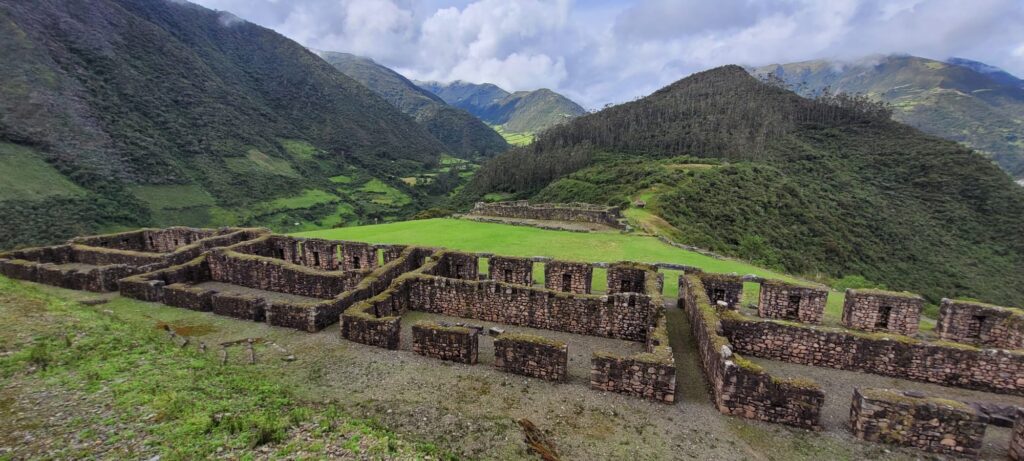Named:” The Pearl of the Balkan”, and lays on the shore of Lake Ohrid. The town of Ohrid is North Macedonia’s most coveted destination.
After traveling for two months in Albania, we arrived in Ohrid and were utterly captivated by its magic and slow pace. A combination of cobblestone streets, a soothing lake, and natural beaches make it a perfect relaxing destination.
The old town is compact, and all the attractions are close to each other, making it easy to spend your day wandering from one site to another.
After 14 days of chilling, eating, and exploring, we gathered our highlight into a two-day tour around the city and lake of Ohrid.
We hope you’ll find it beneficial.
Before we begin, we would like to suggest several tours that are particularly suitable for those coming from Skopje or for travelers with a tight schedule. These tours also cater to those who prefer to have a guide enrich their journey around Ohrid with intriguing historical narratives.
Guided Tours in Ohrid
Full day tour of Ohrid from Skopje
This tour is an ideal choice for those based in Skopje who don’t want to skip the experience of visiting Ohrid. You’ll embark on a 2-hour journey from Skopje to Ohrid, exploring more than 10 of the city’s significant landmarks including the iconic St. John at Kaneo Church and the Roman amphitheater. Guided by a certified professional, you’ll have the chance to immerse yourself in the unique ambiance of Ohrid before heading back to Skopje.
Day 1
A City Walking Tour in Ohrid’s Old Town
Start With a Market Stroll

Start your day with some colors in the local market of Ohrid town. The best day to visit is Sunday when all the farmers gather to sell their fresh products in the open market. On any other day, most of the goods are in the indoor market, right beside the open market. That’s the place in Ohrid where you’ll find the best seasonal fruits and vegetables at the best prices.

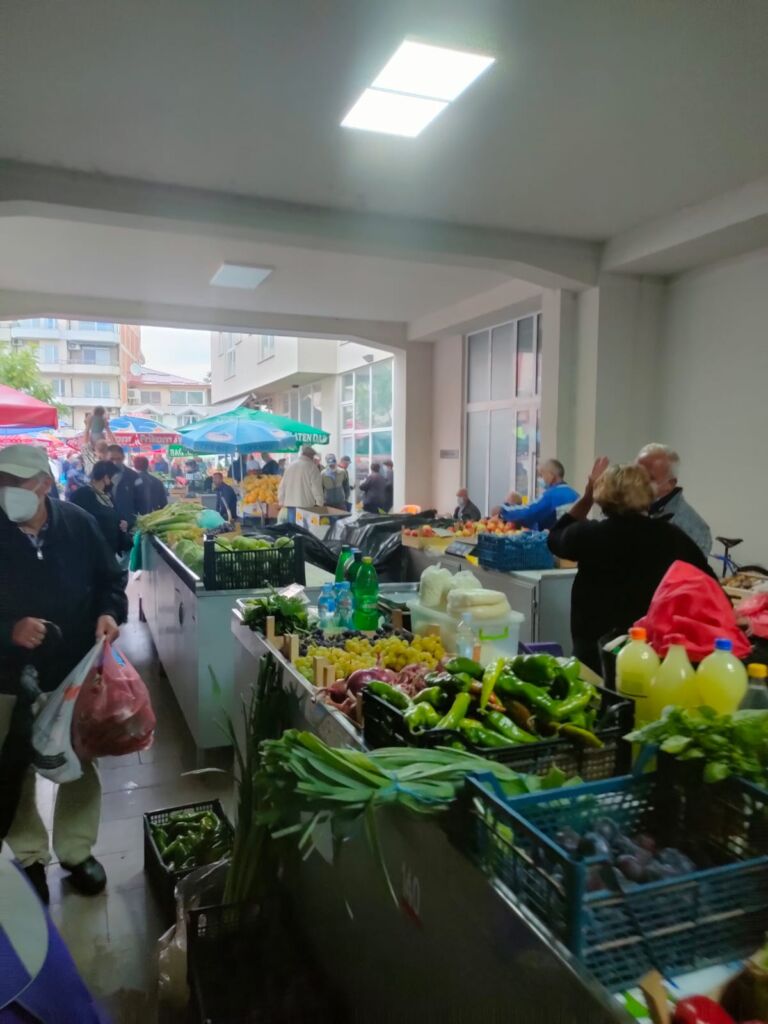
Even if you are not planning on cooking during your holiday, don’t skip a stroll in the market, and maybe a random chat with an old lady will teach you how to make the famous Macedonian pepper paste named Ajvar.

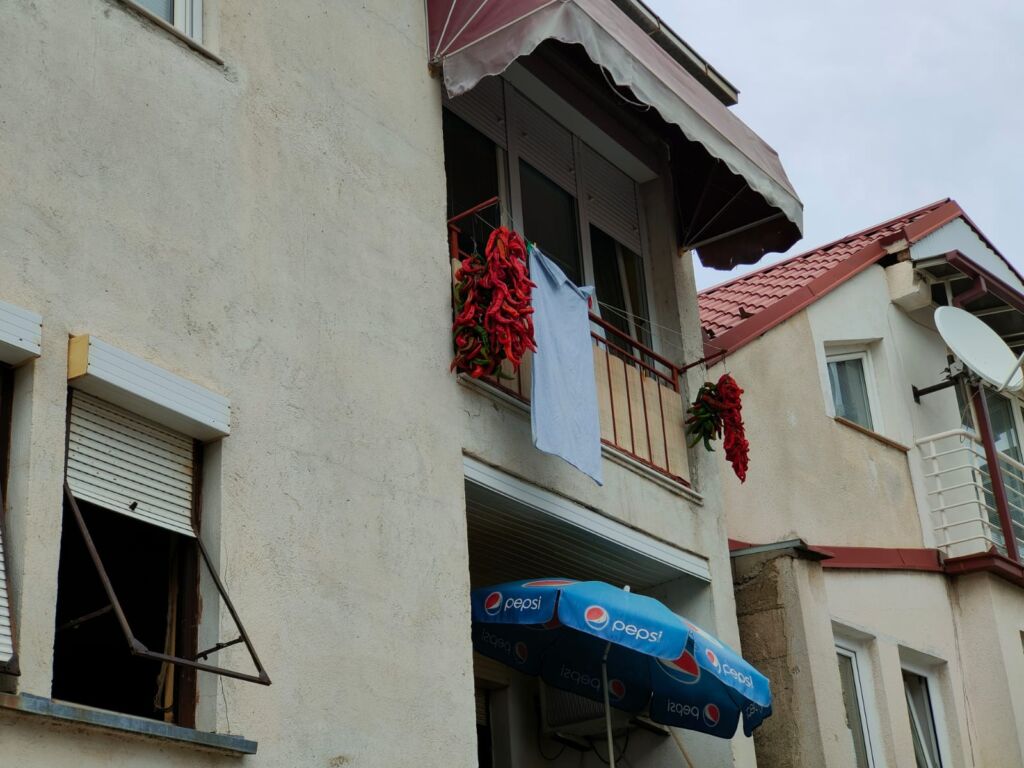
Drink a cold beer on the seats of the ancient theater of Ohrid
Enter the old town through the upper gate\Gorna Porta, walk downhill for 2 min to reach the ancient theater of Ohrid.
The theater in Ohrid was built 200 bc in the Hellenistic period, and it’s the only known Hellenistic type theater existing in Macedonia. Today, the lower Cavia (section of seats) is the only one that still exists. Archeologists do not know how many Cavias there were there to start with.
The theater was used for drama, tragedies, and comedies and decorated with images of Dionysus and the muses.
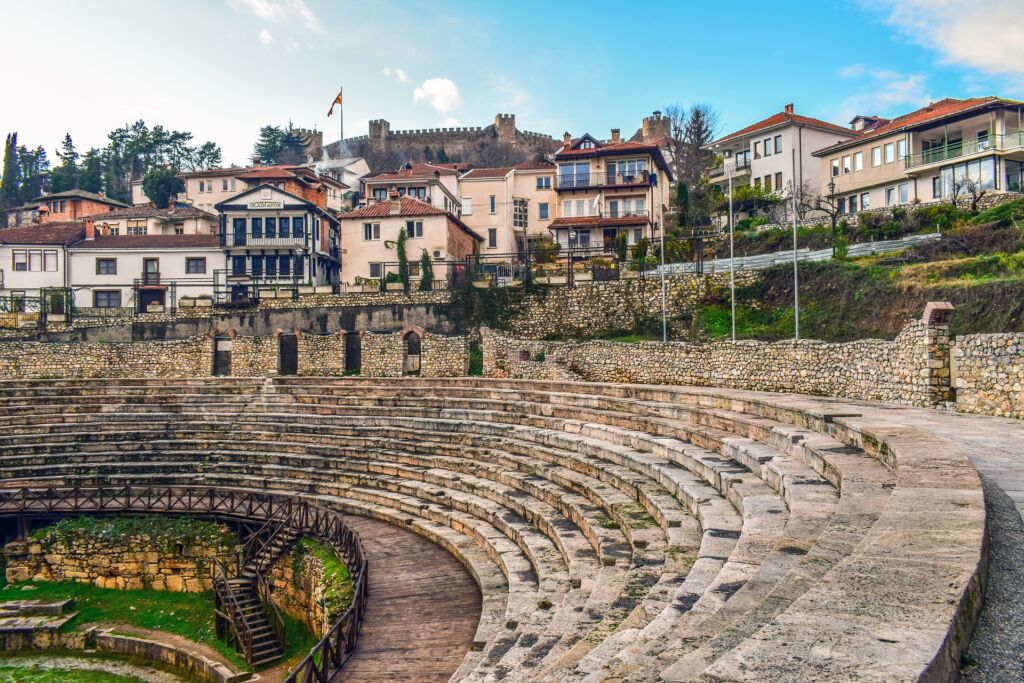
While we arrived, one couple sat on the theater’s seats with a beer from the kiosk beside. It looked like a movie scene.
We also got a drink and joined them on the other side of the theater. At this moment, four people were using a structure built for a crowd of thousands.
Till the beer reached the bottle’s midpoint, more and more people crossed and stayed for a bit before they moved on. Looking at the randomness of others on the steps of the theater made everything look like a show.
The Romans sought different entertainments and operated the theater as an arena for gladiator fights because of the absence of an amphitheater in Ohrid. years later, when the Romans adopted Christianity, they covered the theatre because of its connection to a culture condemned by Christianity at te the time. Sand and sediments preserved the theater underneath beautifully until it was found by accident in 1980 during a reconstruction work of houses.
Continue walking downhill, and follow the signs to St.Sophia church. You can walk and see its outer entrance and stay for free in the garden around the church. The entry fee inside the church is 100 Den, 2euro.
Visit the Church of St. Sophia
We enjoyed the church’s garden and went there almost every day. With a beautiful and serene space, it provides a spot in the town’s center to rest in and enjoy the church’s view, and it’s free to enter. Oh, there are also four turtles there constantly mating.
And now some history.
The church’s structure reflects the diversity of religions that people worshiped in the area of Ohrid for over 1000 years. The Romans built the church in the fifth century. Since then, It was destroyed and rebuilt several times, reusing materials from the previous structure. The general final appearance of the church from the outside was made in the 10th century by Boris the 2nd. In the following century, Archbishop Leo of Ohrid was responsible for most of the inner decoration. Byzantine style fresco’s that you can see til these days. Archbishop Gregory II built external additions in the 14th century.
In the 15 century, with the Ottoman conquest, the structure was converted into a mosque. The Muslims plastered the frescoes, as it is not allowed in Islam to have an image. A minaret was built in the north chapel and a praying niche facing south towards Mecca. The minaret was destroyed in 1912. After the Second World War and the liberation of Macedonia, conservation works were immediately taken on the architecture and paintings, making the church Saint Sofia a representative object that Macedonia can proudly show to the whole world.
Enjoy the Beaches of Lake Ohrid
Without a doubt, the best part of your day.
Continue walking downhill toward the lake. A small gap between the housing structures will lead you to a wooden bridge built on the water. Walk on this spectacular path and visit the different beaches. Stop, dive, bathe, and let the lake do its magic.
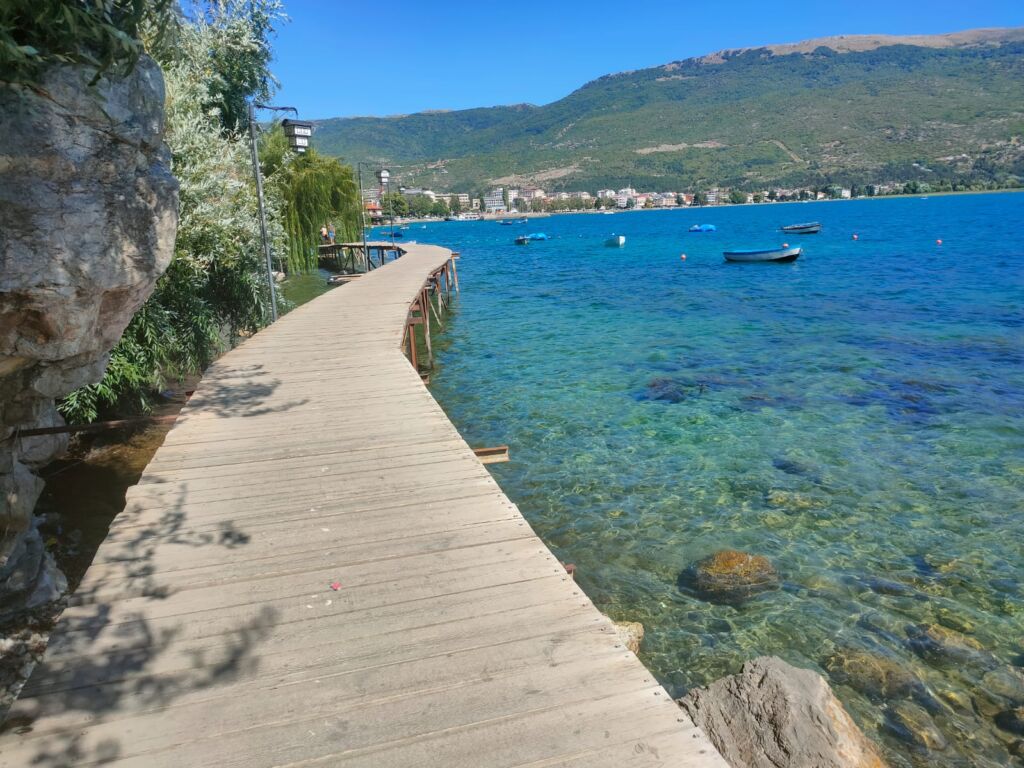
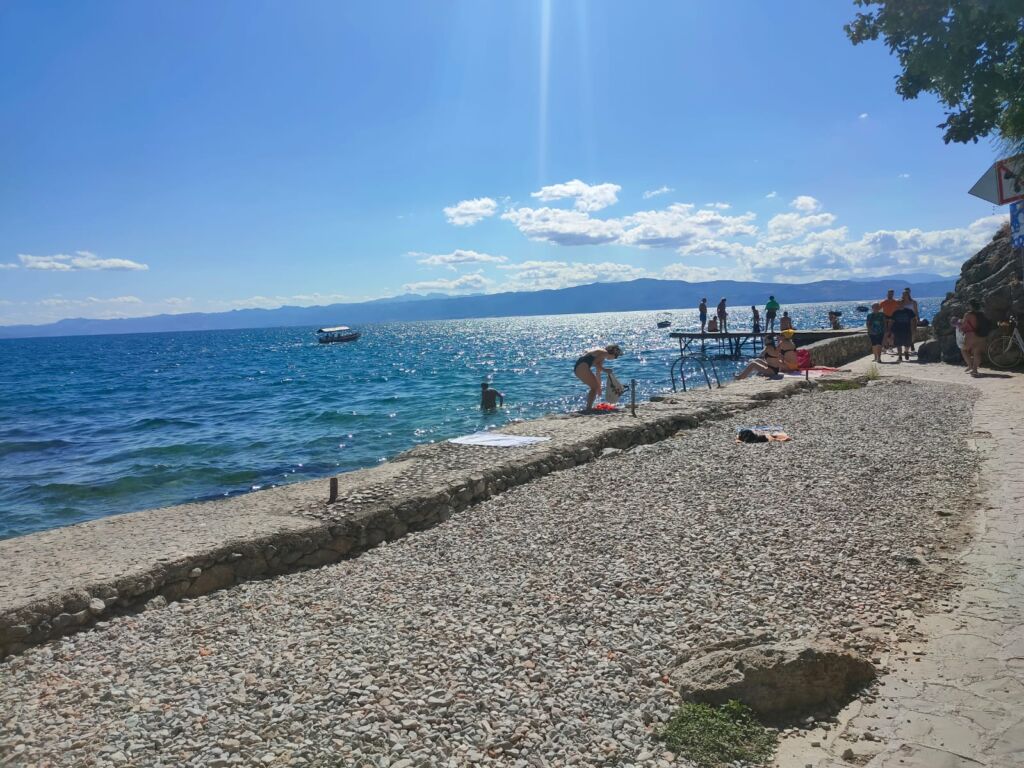
If you are into bars on the beach and loud music, maybe you’ll find that Ohrid’s beaches are a bit boring. But if you love wild nature, like us, you’ll LOVE it.
Ohrid is the largest and most important natural lake in Macedonia and preserves an ecosystem with over 200 endemic species. With an altitude of 693.17 metres, it is surrounded by mountains over 2000 m high. The maximum depth of the lake is 287.5 m and reflects its tectonic origin. Lake Ohrid is approximately two million years old and is the oldest lake in Europe. On the shores of the lake lays Ohrid town, one of the oldest human settlements in Europe.
In the last years, human activity on the lakeshore caused pressure over the ecological system. Nature conservation values of the lake were about to disappear. Unesco warned Macedonia about its heritage status when more privately owned beaches took over the shore, cut off the trees around, providing space for sunbeds, beach umbrellas, and bars. North Macedonia took active steps to evacuate everything unnatural away from the beach to maintain its Unesco title. Starting June 2021, the shores of Ohrid look like an undiscovered island. People can lay on the ground and enjoy the shades of Salix trees around. Little blue boats scattered casually on the lake look like a part of a theater setting.
Clear Your Mind at Kaneo Beach
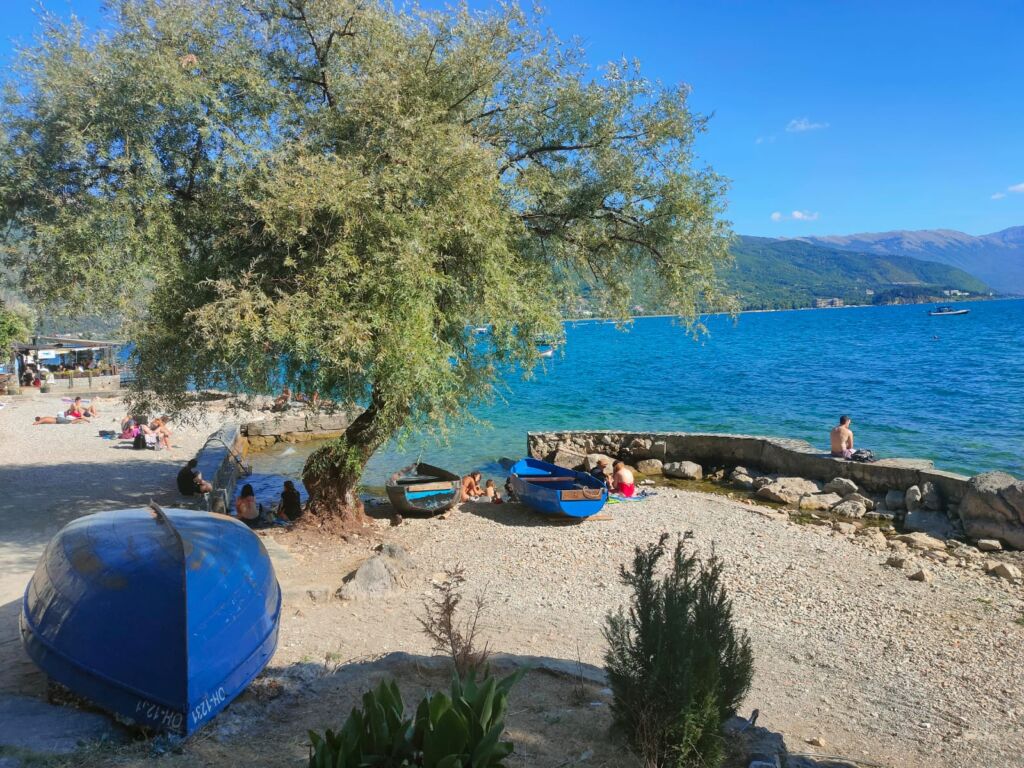
Our favorite location was Kaneo beach. Let us explain why. It’s a beach visited by tourists and locals. Singles, couples, and families all merge, enjoying one another and everything around. The lake’s water is transparent and cool due to the proximity of freshwater springs in the area. One part of the beach is gravel, while the other part is an old port used by the church and monastery above. Nowadays, many people sunbathe on the pier near the water.
Kaneo restaurant is next to the beach if you’re hungry or care for a drink. Its reputation precedes it, though we didn’t try it we heard from a reliable source it’s food is delicious.
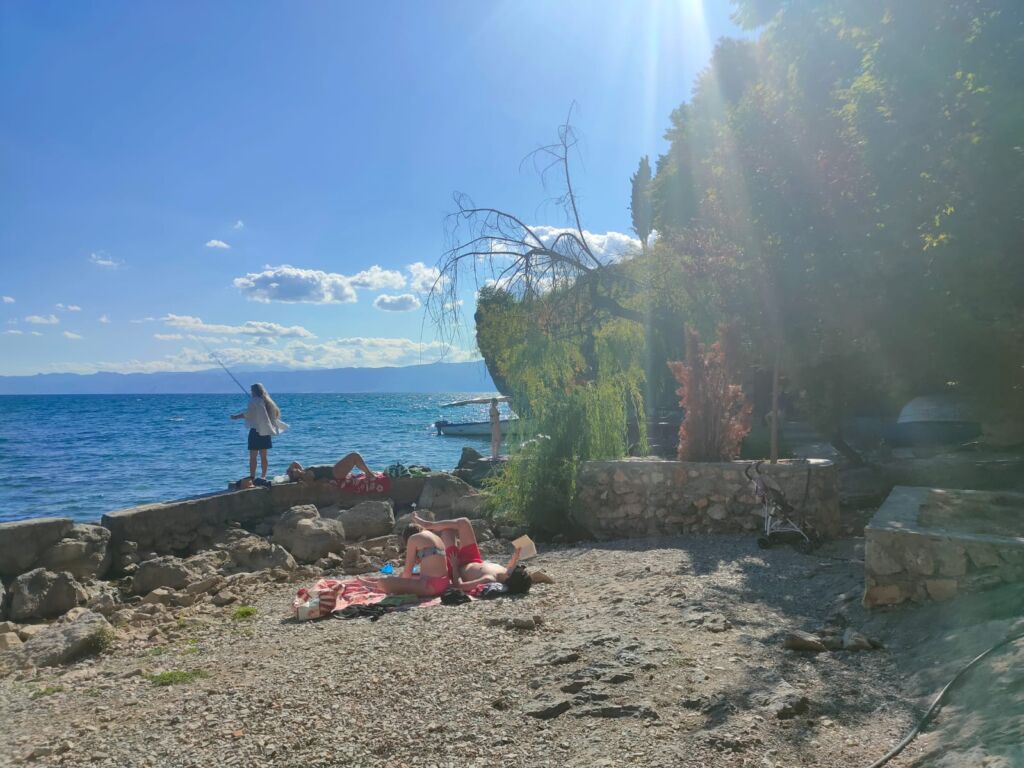
When looking up you’ll see the church of St. Gorge. Climb up the path and visit the church and the gardens around with its picturesque view. Entry is not allowed with a bathing suit so make sure you put some clothes on.
Climb to Church of St. John of Patmos at Kaneo
Have you seen the picture decorating every article about north Macedonia? Well, that’s the church of st. John.
The church of st. John is a Macedonian Orthodox church that is situated at Ohrid’s most beautiful spot. The church is a basilica structure shaped like a cross with a rectangular base and a dome above. It stands on a cliff overlooking the lake, turning it into the best sunset spot in Ohrid town. The construction date of the church is still unknown. However, archeologists believe it was built around the 13 century, before the rise of the Ottoman empire. The church is dedicated to John of Patmos, which most consider as John, the apostle. You know, the Gospel of John, that’s him.
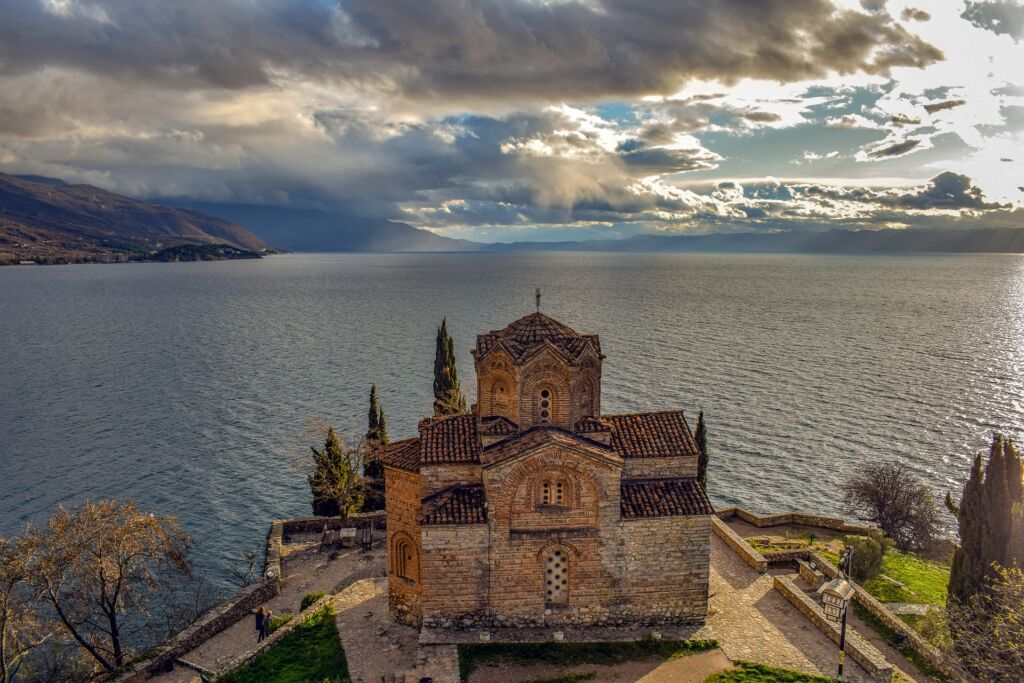
You Have Heard So Much About Him
John Ben Zabdi, one of the twelve apostles, also wrote the Gospel according to John and the Epistles of John in the New Testament. John is also the author of the book of revelations, the only apocalyptic book of the new testament. By tradition, John authored it during his exile on the Aegean island of Patmos in the days of the Roman emperor Domitian in about 95 CE.
John is known to be the loved disciple by Jesus, who always stands by his side in various icons. For example, on the iconostasis that hides the altar in orthodox churches, John’s icon is always to the left-hand side of Jesus, while Mary is to Jesus’ right-hand side.
The Tour Continues
From the church, find the stone path leading up to the boardwalk of Ohrid. This scenic trail will lead you to Labino beach. After 15 minutes walk with the sea on your left, take a left turn downhill to the beach. It’s a short walk, during which your finger won’t leave the camera’s click button.
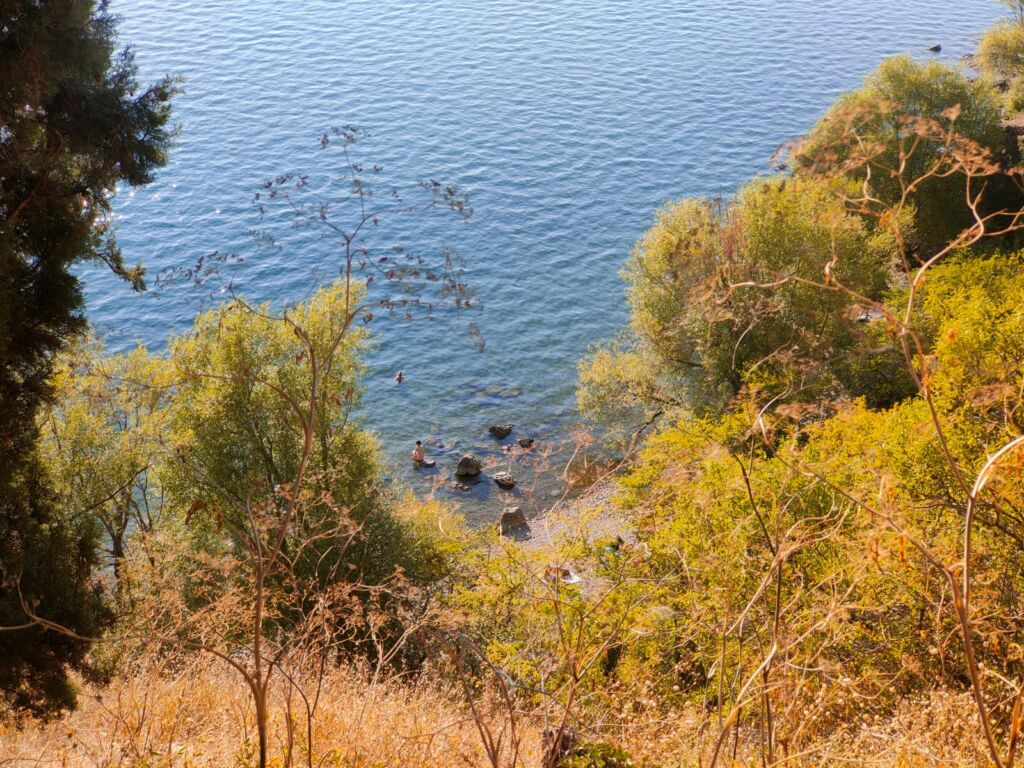
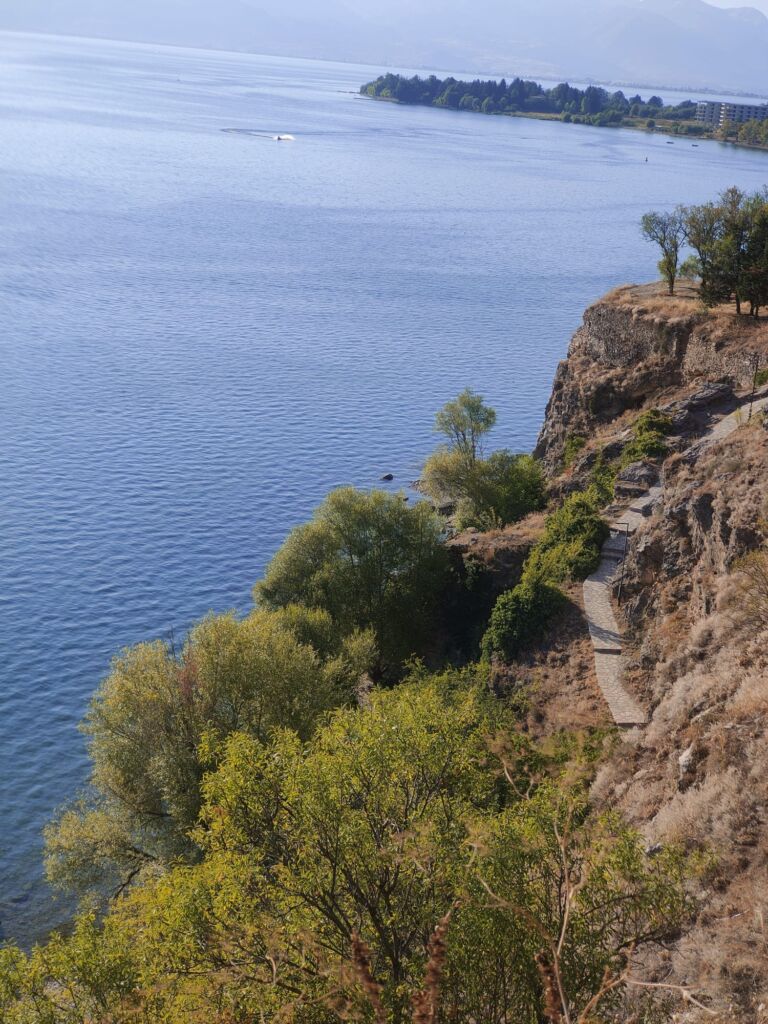
Cherish the Nature at Labino Beach
The locals in Ohrid glorify Labino beach, and they have a point. Indeed, It’s the most picture-worthy beach in North Macedonia. The shore is long and narrow, with giant fruit trees alongside it. In fact, some of them are so big you could feel completely alone. It is also an excellent place to open your tent if you’re looking for an unofficial camping site in Ohrid.
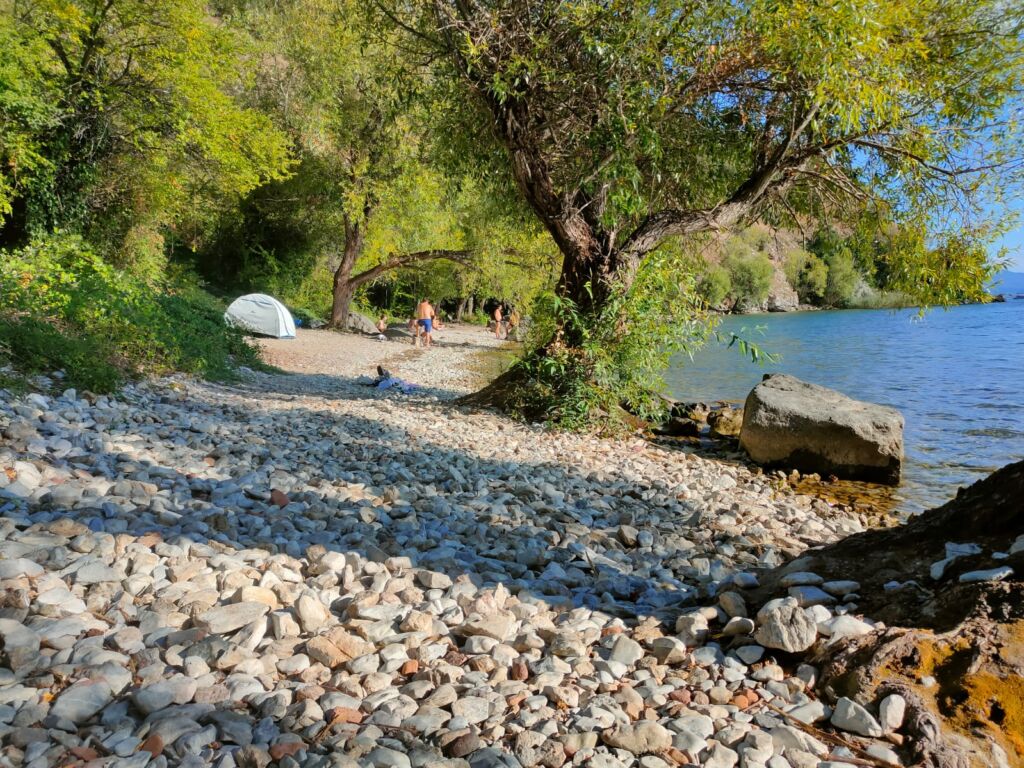
The but is coming.
But, we found it a bit dirty, and the water was not as clear as Kaneo, for example.
And yet, I wouldn’t miss it.
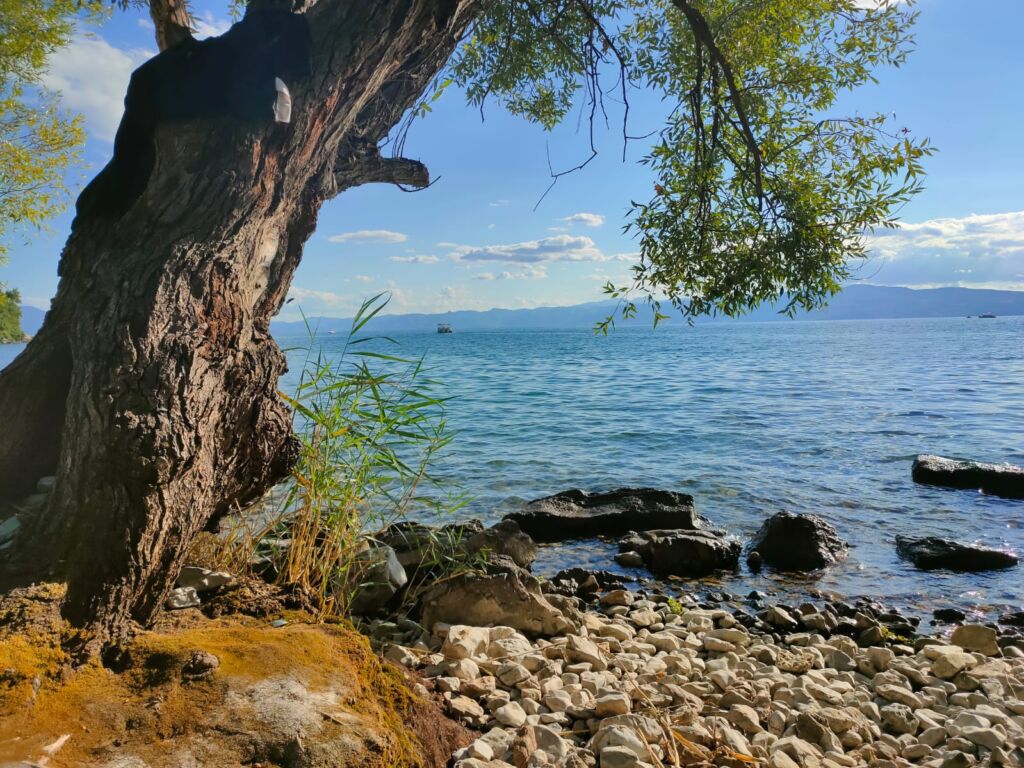
Day 2
Visit St. Naum Monastery by the Shores of Lake Ohrid
The monastery of St. Naum is the best-known attraction in lake Ohrid and is located only 28 km from Ohrid town and 2 km from the border with Albania. The complex Combines a monastery, school, guest houses, restaurants, and Ohrid’s outstanding water sources.
Attractive in nature and religious heritage, St. Naum is the perfect day activity while visiting Ohrid. The complex sits on a wide Plato, blending beautifully the natural water springs that nurture Ohrid lake and the religious complex.
How to get to St. Naum from Ohrid
By Bus
The bus ride lasts 45 min and costs 110 MKD one way (2€). For a round trip, 170 Mkd (3€). If you know the time you wish to return, it will be better to get the round-trip ticket and tell the driver the return hour. Because on our way back, the bus driver arrived with a private car to pick us up (we love the Balkans). The bus station at St. Naum Church is in the parking lot, and you can’t miss it.
Time tables of buses from ohrid to St. Naum:
6:15, 7:00, 9:15, 11:30, 12:15, 15:30, 16:15, 18:30, 19:15.
Time tables of buses from St. Naum to Ohrid:
7:15, 8:00, 9:30, 10:15, 12:30, 13:15, 16:30, 17:15, 19:30, 20:15.
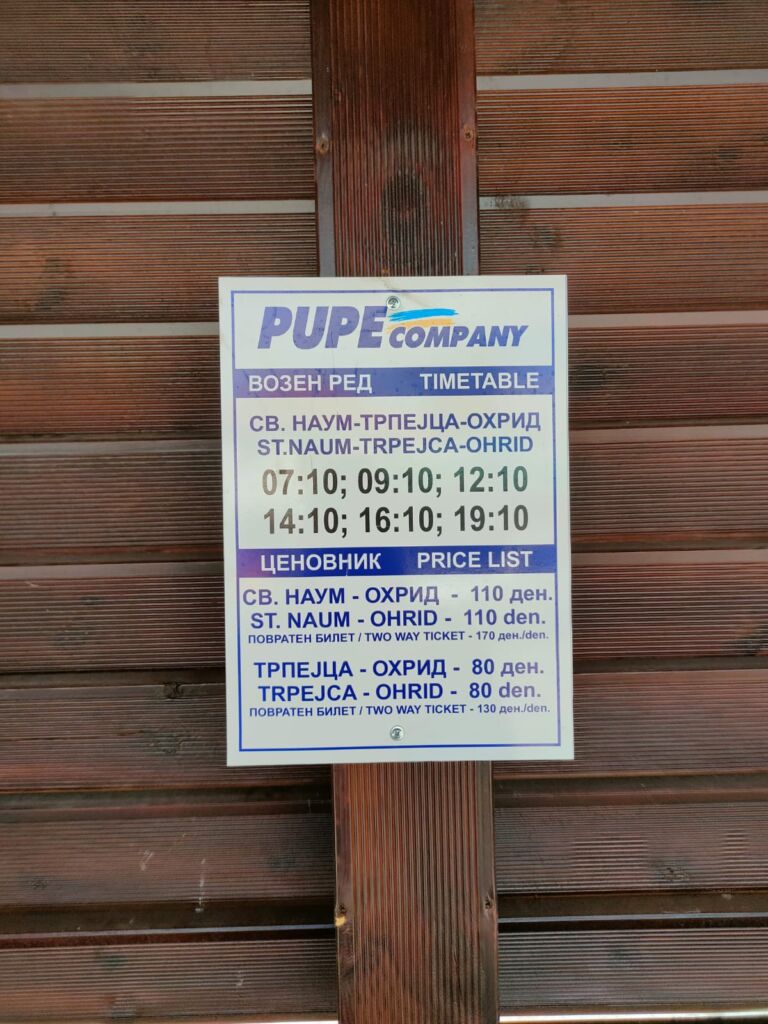
By Boat
During the summer, a boat tour leaves the port of Ohrid at 10:00 and gets back at 16:00. It includes a slow sail along the east coast of the lake, close enough that you can photograph. The tour stops at the bay of bones for an hour, arriving at St. Naum, where you have two hours to walk and look around. Sailing back to Ohrid is faster as it takes the mid-lake route.
Boat tickets tend to sell out during the peak season, so we recommend making your purchase in advance. click here to book your tickets and get a full refund if you cancel 24 hours in advance.
Religion and Heritage
I am sure there’s a connection to Kfar Naum-Jesus’ town in the holy land by the Sea of Galilee. Not only because of the name but also due to its proximity to the lake. The monastery of St. Naum in Ohrid feels like a magnified version of the village of Kfar Nahum by the sea of Galilee. I felt and saw the similarity. So If Christianity touches you somehow, I think it would be nice to wonder about it while strolling the area.
About St. Naum
St. Naum of Ohrid was a medieval scholar and writer. Together with St. Clement, he continued the task of spreading Christianity among the Slavic-speaking people. He was among the disciples of Saint Cyril and Saint Methodius and created the Glagolitic and Cyrillic letters. He built the original monastery in 905 and died five years later on December 23, 910, at the sanctuary “St. Naum,” at the age of 80. St. Clement himself buried him in the monastery church dedicated to the Holy Archangels Gabriel and Michael.
Soon after his death, Naum became a saint because of the miracles at his grave and monastery.
The area where the monastery of St. Naum lies belonged to Albania for a short period from 1912 until June 28, 1925, when Zog of Albania ceded it to Yugoslavia as a gesture of goodwill. I believe events like these influence the site’s energy, as in any other holy place, and it’s important to cherish and commemorate them.
A fantastic Short Walk by the Water Sources of Lake Ohrid
While scrolling around St. Naum, you can’t ignore the magnificent clear water flow that is the source of Ohrid lake. Walk up the bridge towards the church while the springs’ peaceful, silent water flows to your left. The water is so clear you need to look closely to see that it is even there. Inside, the coins on the bottom of the river sparkle. It’s hard to leave the bridge while the water sight is intoxicating.
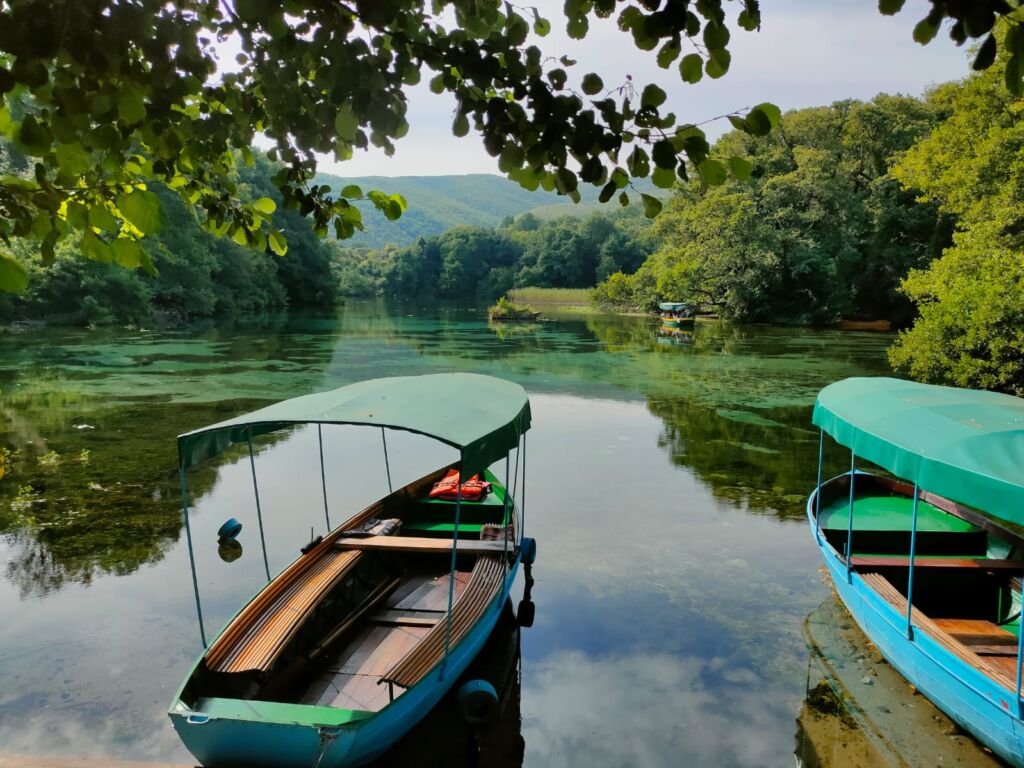
Consider taking a boat ride to the sources of lake Ohrid. We haven’t done that, so I can’t tell you about it.
On the other hand, we can offer you a better alternative that will take you to the head of the spring, by foot.
Please don’t skip it, don’t miss it. When we did it, we saw no one and were completely alone. That was St. Naum’s highlight in my eyes.
The trail will bring you to small charming chapels and to the perfect place to make a headfirst to the springs with no one around.
A circular path surrounding the St. Naum complex, of 2 km, takes 30 min to walk, and it can take an hour if you stop to look in the chapels and enter the springs.
We felt like it was just us in the world, and we received an opportunity to visit the undiscovered chapels standing by the springs of Ohrid.
Church Hopping
The first church you’ll run into is St. Petka Church. Walk on the foot trail while the church is to your left. Continue straight with the water springs to your left and after 10 min you’ll arrive at ‘The Mother of God Church.’ Inside the chapel under the alter, water penetrates the church without flooding it, making it hard to believe a man can build such a thing.
Carry on, between the bushes, a sight of the garden of Eden will open. That’s where the sources of Ohrid burst from the earth. There are a few spots for you to enter the water, and it’s ice-cold and crystal clear. In addition, you should be careful of the stinging nettles that grow there. It’s not dangerous but can be unpleasant.
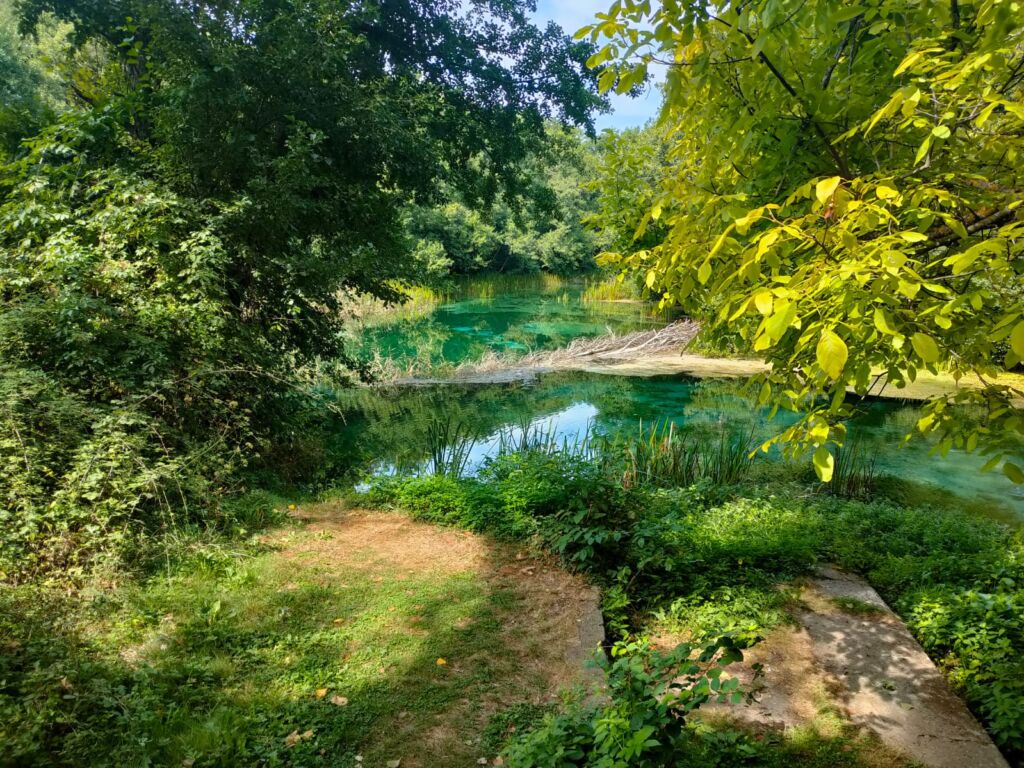
You have to jump.
We felt the minerals upon our bodies after exiting the water.
By all means, entering inside Ohrid’s water springs and sources was a rare opportunity to feel with our skin and not just observe with our eyes.
From there, we ran into the monastery of Saint Athanasius. It seemed abandoned, but the gate was open. Of course, we went inside. It felt peaceful and serene, similar to the spring water atmosphere.
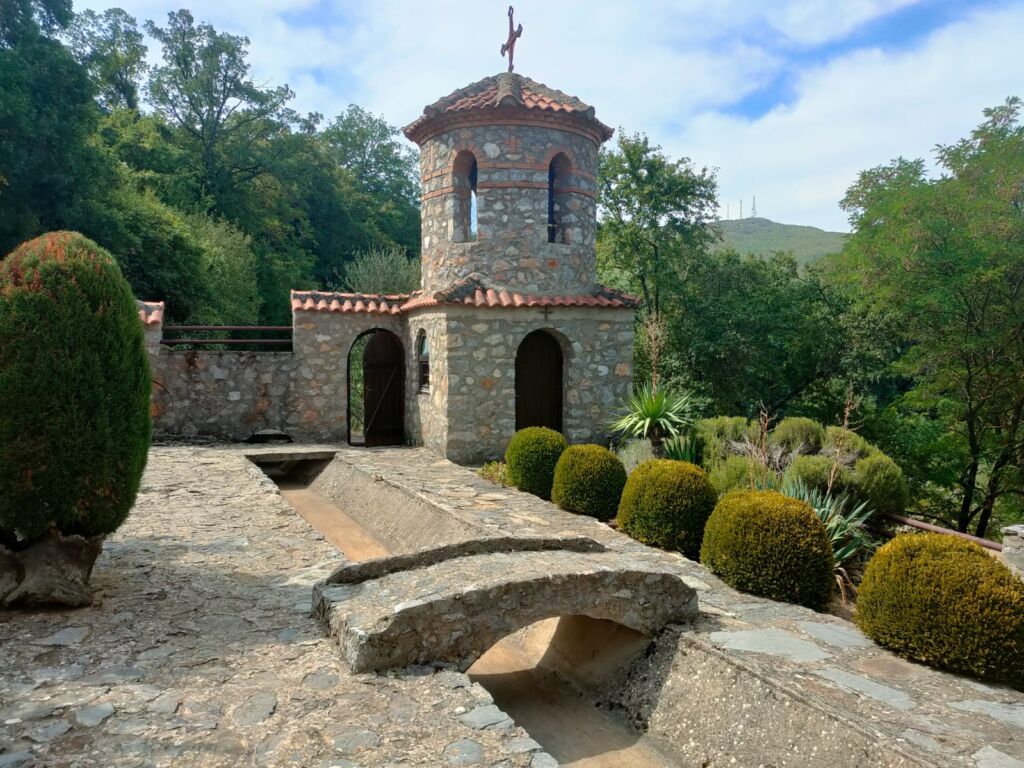
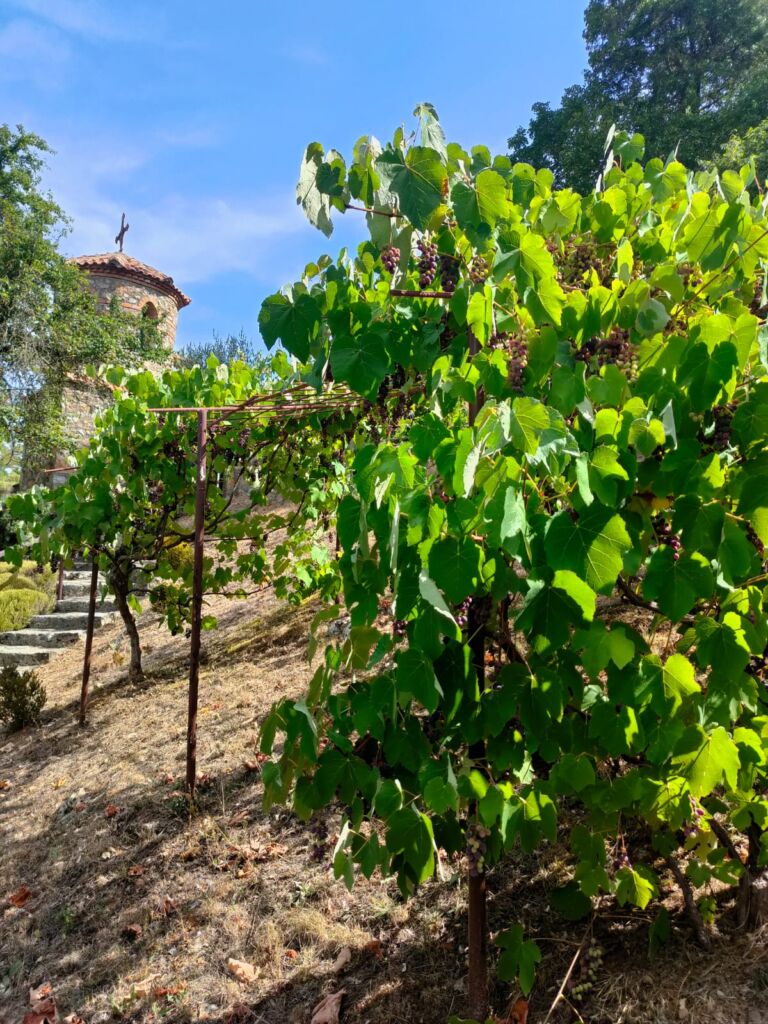
Complete the circle that ends in the parking lot of St. Naum. Where you can catch a bus back to Ohrid town.
Where to Stay in Ohrid Town
Old Town Hostel
We stayed for two weeks at the Old Town Hostel and found it the best hostel we stayed in during our travels along the Balkans. It has everything we are looking for in a hostel. With clean rooms, a spacious communal area, an inviting host, and that hostel vibe you can’t fake. The positive energy of Natasha, the host, is transferred to the guests, so every evening ends with piles of empty beer bottles and new friendships. The Old Town Hostel is a great place for solo travelers and families alike. It is located in the center of the old town, walking distance from the best beaches, the bus stop to St. Naum, and the main bazaar. We cannot recommend it enough.
Final Thoughts
Before arriving at Ohrid, we were worried that we were traveling to a touristic boring vacation town. We are happy to say we were wrong. Even though there are a lot of tourists in Ohrid, it still manages to keep its charm. And if you are smart enough to come in the off-season, you will have the beaches almost for yourself.
Sometimes traveling for a while can be tiring, we found Ohrid town and lake to be recharging. I guess there is a reason why Phillipe the 2nd decided to choose to build his summer home in Ohrid town.



